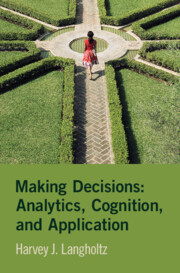Book contents
- Making Decisions: Analytics, Cognition, and Application
- Making Decisions: Analytics, Cognition, and Application
- Copyright page
- Dedication
- Contents
- Figures
- Tables
- Preface
- Acknowledgments
- Copyright Acknowledgements
- Part I Analytics: Probability, Evaluation, Decision Trees, and Strategies for Decision Making
- 1 Introduction to Decision Theory and Decision Making
- 2 Thinking Like a Gambler: For All the Gambles of Life
- 3 Using Decision Trees to See through the Forest Ahead
- 4 Strategies for Decision Making in an Environment of Risk: How to Get the Most and Avoid the Worst, No Matter What
- Introduction to Part II: Cognitive Processes of Decision Making
- Part III Applications, Examples, and Selected Topics
- References
- Index
1 - Introduction to Decision Theory and Decision Making
from Part I - Analytics: Probability, Evaluation, Decision Trees, and Strategies for Decision Making
Published online by Cambridge University Press: aN Invalid Date NaN
- Making Decisions: Analytics, Cognition, and Application
- Making Decisions: Analytics, Cognition, and Application
- Copyright page
- Dedication
- Contents
- Figures
- Tables
- Preface
- Acknowledgments
- Copyright Acknowledgements
- Part I Analytics: Probability, Evaluation, Decision Trees, and Strategies for Decision Making
- 1 Introduction to Decision Theory and Decision Making
- 2 Thinking Like a Gambler: For All the Gambles of Life
- 3 Using Decision Trees to See through the Forest Ahead
- 4 Strategies for Decision Making in an Environment of Risk: How to Get the Most and Avoid the Worst, No Matter What
- Introduction to Part II: Cognitive Processes of Decision Making
- Part III Applications, Examples, and Selected Topics
- References
- Index
Summary
Decision theory and decision making are multidisciplinary topics. Decision theory includes psychology, especially cognitive psychology, because decisions are cognitive processes. Decision theory also includes math, especially probability, as people often make decisions based on likelihood. Decision making is an applied topic pertaining to business, engineering, science, politics, other disciplines, and of course to personal decisions.
Descriptive models of decision theory explain decisions as cognitive processes, how and why people make the choices they do. Normative decision models describe how people should conceptualize a decision. Prescriptive models include mathematically based analyses that provide actionable solutions to real-world problems.
Decisions are made in one of three environments. Under certainty, the decision maker can make a choice and be sure what the outcome will be. Under risk, the decision maker will make a choice knowing in advance the probabilities of various outcomes. Under uncertainty, the possible outcomes and probabilities are unknown.
Keywords
Information
- Type
- Chapter
- Information
- Publisher: Cambridge University PressPrint publication year: 2025
Accessibility standard: WCAG 2.0 A
Why this information is here
This section outlines the accessibility features of this content - including support for screen readers, full keyboard navigation and high-contrast display options. This may not be relevant for you.Accessibility Information
Content Navigation
Allows you to navigate directly to chapters, sections, or non‐text items through a linked table of contents, reducing the need for extensive scrolling.
Provides an interactive index, letting you go straight to where a term or subject appears in the text without manual searching.
Reading Order & Textual Equivalents
You will encounter all content (including footnotes, captions, etc.) in a clear, sequential flow, making it easier to follow with assistive tools like screen readers.
You get concise descriptions (for images, charts, or media clips), ensuring you do not miss crucial information when visual or audio elements are not accessible.
You get more than just short alt text: you have comprehensive text equivalents, transcripts, captions, or audio descriptions for substantial non‐text content, which is especially helpful for complex visuals or multimedia.
Visual Accessibility
You will still understand key ideas or prompts without relying solely on colour, which is especially helpful if you have colour vision deficiencies.
Structural and Technical Features
You gain clarity from ARIA (Accessible Rich Internet Applications) roles and attributes, as they help assistive technologies interpret how each part of the content functions.
